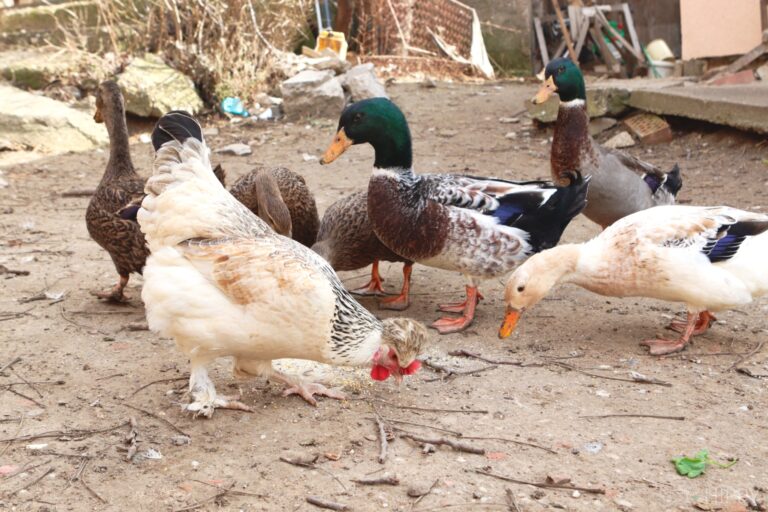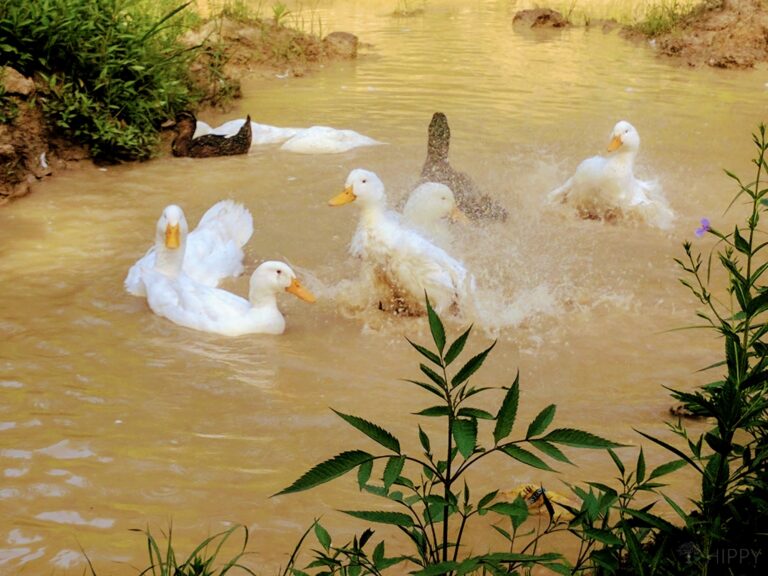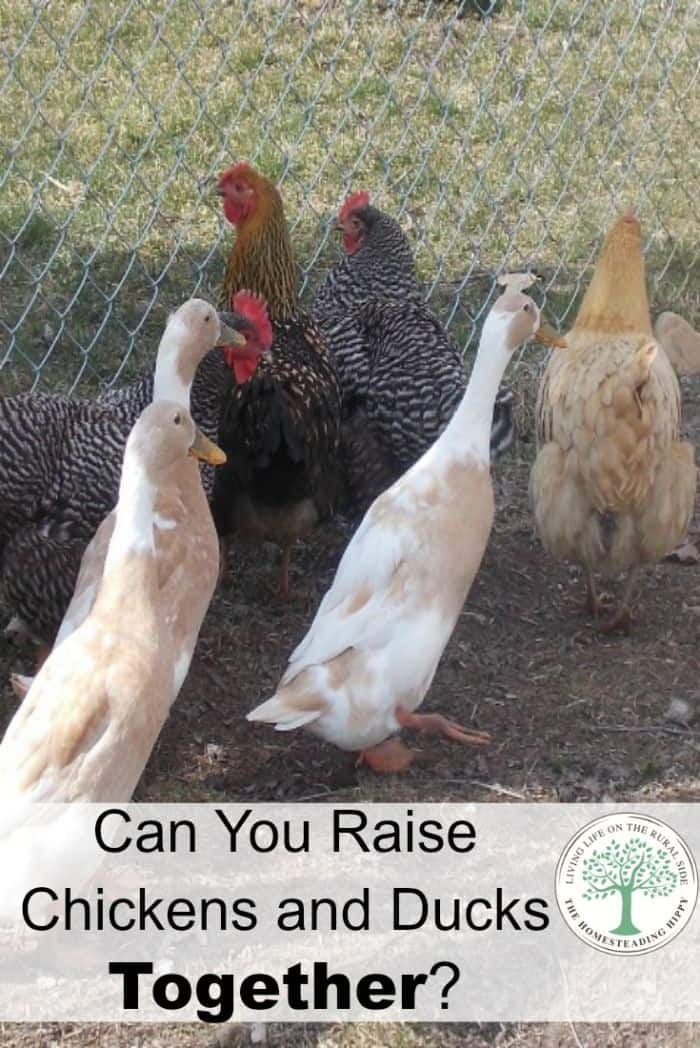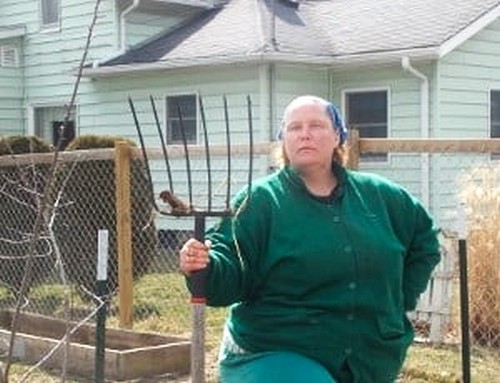This is a commonly asked question for homesteaders, and a very valid one. There are a lot of different opinions on this, so the answer is necessarily black and white.

Chickens and ducks have enough differences that housing them separately would be ideal in many cases. But, what if you don’t have the room? Can chickens and ducks live together?
Adult ducks and chickens can live together, but they will need separate food, and for you to keep an eye on roosters and drakes. Baby ducks may trample baby chicks due to their size so they’re best kept separate.
There are several considerations you will need to make, and we’ll break them down here for you.
They Need Separate Brooders
First, it would be best to brood ducks and chickens separately if you can. If you are NOT able to (we usually can’t due to space) then there are some things to remember. Ducklings like water and playing in the water. Chicks, not so much.
Ducklings can splash water everywhere in the brooder that gets the bedding and chicks soaked. To keep them both safe and happy, add just a regular chick waterer to the brooder. The ducks will get enough to drink from it.
We also took our ducks out regularly and let them play in the tub with a pie pan full of water daily for about an hour or so.
They were happy with that. In the wild, a mother duck will put oil on the ducklings’ feathers, allowing them to float in the water.
Since they are not wild, and I am not a mother duck, placing ducklings in deep water for long periods of time can actually cause them to get soaked and even drown.
If you brood them separately, when introducing ducks to chickens, it’s best to do it at night when the chickens have roosted.
When they are sleeping, they don’t notice “strangers” being added to their coop and run as quickly. This helps them blend together into one flock more easily. Ducks and chickens WILL play together nicely, eventually.
If you brood them together, make sure you keep a good eye on the environment during this period.
You should keep the temperature between 90 and 95 degrees F (32 – 35 C), reducing the temperature every week by five degrees. Stop reducing it once it reaches 70 degrees F (21 C), which is often when the birds are ready to go outside.
Keep the brooder as draft-free as possible. While ducks are a bit more resilient to the cold air than chickens, you still need to keep them nice and warm.
They Can Live Together as Adults – But With Modifications
Ducks are low-maintenance, and many people find them easier to raise than chickens. The most basic duck shelter can consist solely of a small area with a thick layer of straw.
You don’t need roost bars, as you do with chickens, and they also don’t usually use nesting boxes. Instead, ducks often make their own nests in the straw on the floor, in which they will lay their eggs.
However, ducks require a lot of moisture. They even emit moisture when they sleep! Therefore, any form of duck housing, even mixed or isolated housing, needs to have plenty of good ventilation.
You should make sure airflow is up high and not down by the floor, which can cause drafts.
Keep an eye on the walls of the coop during the winter. If you see condensation on the walls or on the inside of the windows, you need to add more ventilation.
Make sure you cover all windows and vents with ¼ to ½ inch welded wire to prevent predators like snakes and weasels from getting after your ducks, chickens, and their eggs.
Ducks can also make an unholy mess with their food and water. This is a major challenge that arises for people who choose to raise ducks and chickens together – they want to keep feed and water systems inside the coop.
While this is often necessary for the chickens, if you’re raising ducks, it may be easiest to move the whole set-up outside.
This can attract vermin and predators, so you’ll need to set up a secure feed and water system that isn’t easily contaminated or accessible by anybody except your ducks and chickens.
Remember that ducks are more cold-hardy than most breeds of chickens. While your duck housing can be more ventilated and exposed than a chicken coop, this may pose problems to your chickens during the coldest months of the year.
Ducks will sleep on the coop floor at night. If you’re using another method of bedding besides straw in your chicken coop, switch to straw.
This hollow nesting material keeps warm air inside its shafts, which will help keep your ducks warm on the floor as they sleep.
The one major problem that people have in housing ducks with chickens – besides the fact that ducks don’t sleep for long periods of time – is that ducks often choose to sleep under the roost bars of the chickens.
You can block off the area under the roosts or use poop hammocks or trays to help prevent this.
They May Need Separate Food
Not always. Chick starter also can contain anti Coccosidistats. This is often added to help prevent Coccidiosis, which is a parasite that can damage the gut of chickens.
Ducks can easily overdose on the added medication and die. We actually do not feed our chicks or ducklings any medicated feed to avoid this. I haven’t ever had an issue with Coccidiosis myself.
If you choose to use medicated feed, you need to keep an eye on how much the ducklings are eating, or feed them separately. Once ducks and chickens are fully grown, they can all go on the same flock feed regardless.
Adult ducks can eat chicken layer feed, but you might want to add some brewer’s yeast. This will give your ducks the additional niacin they need in order to support their bone and leg strength.
While chicken feed already contains niacin, it is not included at the level your ducks will require. Your chicks will also benefit from the added niacin.
Your ducks may need to be fed wheat, too, depending on how much calcium is in your chicken feed.
While many ducks can find their own food from free-ranging, snacking on things like slugs, insects, duckweed, and grass, wheat will help balance out the extra calcium in the layer feed.
You should avoid giving wheat free-choice to your chickens, however, as it can cause digestive problems as it doesn’t contain enough protein.
When your ducks eat, they will do so by taking a bite of food and then using water to swish it around in their bills. Anytime your ducks have access to food, they also need access to water.
The waterer for your ducks should be a little deeper than that you provide for your chickens – usually a rubber or plastic tub that is a few inches thick will do the trick.
You can feed ducks and chickens the same treats, too. Most treats, like mealworms, cucumbers, and watermelon, are enjoyed by both species, but you should also add treats like leafy greens to your ducks’ diets.
They won’t be as likely to touch seeds like sunflower seeds, pumpkin seeds, or flax seeds. Offer a good variety of treats to keep everyone happy!
Ducks may have a hard time fitting their broad bills into the chicken feeding trough. You will need to use a larger, broader bowl in order to help them out.
There May Be Fighting
Chickens can get cranky and bully ducks. Keeping 1 duck with chickens can exaggerate this, too.
I have seen this happen more often when there are one or two ducks facing off to 6-10 chickens. They can learn to get along, and usually, the ducks will fight back after a while, too.
If possible, keep the number ratio of ducks and chickens as close as possible. Or at least make sure they have enough room to get away from each other.
There can also be some pecking order concerns. As you probably already know if you have chickens, adding a new bird to the flock can take a lot of patience.
The pecking order among chickens is serious and it’s easy for an adult chicken to bully, injure – even kill! – a new bird that is added without ample time for introduction.
If you’re adding new birds to the flock, it’s always recommended that you quarantine them for thirty days to make sure they aren’t going to introduce any disease.
Otherwise, you can add ducks slowly, introducing them for a few hours during the day to initiate a “getting to know you” period. Remember to keep a close eye on the flock if you’re adding drakes or roosters, too.
Chickens Will Put Themselves to Bed at Night, but Ducks Not So Much
We had to train our ducks to go into the coop at night, even during the winter. They like to sleep near their water or IN their water if they can. In the wild, that’s where they would go to get away from predators.
It took us about a month to get it through their heads they needed to go into the coop at night, and during the summer we had to remind them again, since they like to go for nighttime swims.
I live in town, and predators aren’t much of an issue, but if you have lots of them around, you will want to make sure they are secure each night.
The other thing you need to keep in mind in terms of housing ducks and chickens together is that ducks don’t necessarily have the same sleeping patterns as chickens.
While closing your ducks up at night is a good way to protect them from predators and should be done regardless of whether you are housing them separately from your chickens, you should keep in mind that ducks don’t sleep the night through like chickens do.
Instead, ducks prefer to take short cat naps and will alternate periods of sleep with periods of play. This can really irritate your chickens and disrupt their sleep, so it might be best to keep them separate.

Manage the Water
I already mentioned that any time there is food, there will also need to be water. In addition to a source of drinking water, your ducks will also need a place to splash around and bathe in at all times.
While they usually only fully bathe themselves a couple of times a week, you should make sure they have ample access at all times.
Ducks bathe by dunking their heads in water and then allowing the water to roll down their backs. At the same time, they will preen themselves. This keeps their feathers waterproof and keeps them warm in the water.
Many people assume that you need a full pond or pool to keep ducks, but a large rubber tub or kiddie pool will be fine, too.
Make sure you put some cement blocks in the pool to help provide the ducks with steps in and out – this will also help in case a chicken falls in! The cement blocks also keep the pool weighted to prevent it from being accidentally tipped.
It should go without saying, but make sure you don’t allow any young chicks around a large tub or kiddie pool.
It will be very easy for them to fall in and drown. This water source should only be provided to adult chickens and ducks.
Adult chickens will sometimes stand in your water trough when it’s really hot during the summer, but they will stay away if they know it’s too deep.
If you need to keep baby chicks near your water trough or pool, consider gating it off so that they can’t get through but the ducks can.
Ducks are really good at using gravity containers and nipple waterers – they can empty them in a matter of minutes.
They may have a hard time getting their heads into the narrow reservoirs of chicken drinkers, so adding a larger tub for your ducks is advised.
It will be extremely difficult to keep the water clean. Ducks muddy up water quickly, so while you can’t do a lot to keep them out of it, you should make sure the water is freeing each morning.
Health Concerns
Keeping chickens and ducks together won’t necessarily subject either to additional illnesses or disease. As with raising any animal, keeping the area clean and tidy will help to prevent any issues.
Ducks are very healthy because they have comparatively high body temperatures that keep most pathogens, parasites, and bacteria away.
They spend so much time in the water that they also aren’t usually affected by ticks, mites, or lice.
Ducks do not usually get Marek’s, which is a concern to young chicks. Ducks can carry the avian flu, but this is uncommon and if your ducks are affected, your chickens will be too – so it’s not an issue introduced solely by owning backyard ducks.
The one health concern you will need to keep in mind with ducks is that, because they make such a mess with their waterers and pools, they are much more likely to introduce disease that way.
It’s easier for bacteria and other pathogens to survive in a damp, unsanitary environment – so you will really need to stay on top of cleaning your coop and making sure it is consistently filled with clean, dry bedding at all times.
Roosters and Drakes
You will need to exercise a bit more caution if you have males mixed into the flock. Keep an eye on your breeds of chickens and ducks, as some are more aggressive than others, but remember too that males of any breed will always be more territorial and hostile.
During mating season, you will need to keep an eye on your flock. Keeping a drake without a rooster – and a rooster without a drake – can be detrimental.
Drakes may become aggressive toward chicken hens, so it can help to have a protective rooster – and vice versa. Raising mixed-gender flocks is also more successful if you start at a very young age.
You shouldn’t expect any issues with trying to breed members of the opposite species, but you may have some fighting.
The key to eliminating fighting is to make sure there are enough females of each breed. You should keep ten to twelve hens per rooster and two female d ducks per drake. This will help keep the peace.
If there is any fighting within the flocks, you may need to remove the bully or re-balance your ratios of males and females.
Keeping ducks and chickens together in the same run and foraging area during the day but separate sleeping quarters at night can also help prevent fighting issues.
So, with a little bit of forethought, ducks and chickens CAN live together successfully. However, depending on your circumstances, it might be easier (and better for everyone) to simply raise them separately.
Be sure to weigh your options carefully before you attempt to create a mixed flock.
Do you raise both together? What are YOUR thoughts on this? Be sure to pin this to your favorite board for later.


Heather’s homesteading journey started in 2006, with baby steps: first, she got a few raised beds, some chickens, and rabbits. Over the years, she amassed a wealth of homesteading knowledge, knowledge that you can find in the articles of this blog.
Learn more about Heather and the rest of the writers on this page.

Good article and great practical advice. I raise chickens and ducks together and found your comments spot on. I find that since the ducks sleep on the coop floor and the chickens roost above, there is plenty of room in the coop.
My experience has been the same as yours in most ways, except for the bullying. My ducks (the drakes) actually bully the chickens. I have some drakes that are going in the stew pot 😉
The one thing I might add which you touched on for anyone thinking of ducks is that, ducks are MESSY if you raise them right. Because they need deep enough water to at least dunk their heads into to keep their nostrils clean, there must be open water sources. I use buckets as they can’t get enough of their bills into chicken waterers. They also need water to swim in as it keeps their feathers and body in condition. I do not have a pond, but use plastic wading pools. Even in winter (I’m in Zone 5b) they will happily swim once or twice a week.
A couple winters ago we had deep snow and I loved how they “swam” through the powder. I actually shoveled out a path for the chickens, but the ducks loved the snow!
Thanks for your practical and “real” information. I find a lot of blogs are just too slick and glossy for me, but yours is true life on a small homestead. Keep up the good work.
I love the idea of ducks swimming through the snow… how fun to watch! Thanks for your kind comments, I am so glad you are here!
My ducks and chickens get along fairly well. Love watching all their antics.
Am first time breeder of ducks (the black ones). They are 3:2 male 1 female. Have since removed 1 male. I have 5 local breed chickens. They live in harmony with the ducks, they eat, drink&sleep together although i have provided an extra basin of water where they drink and bathe. I find them peaceful and disciplined birds.
Hi i am new at this !!!!! i have 16 chickens and two ducks they where brought up together they sleep all together in a big coop what age should i take the duck and put them in there own coop ? i here that if i leave them together over night when they get older the chickens will kill the duck . what do you think ?